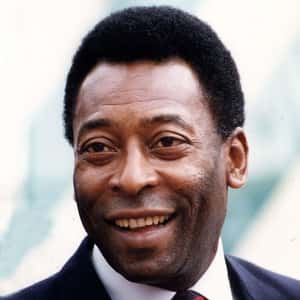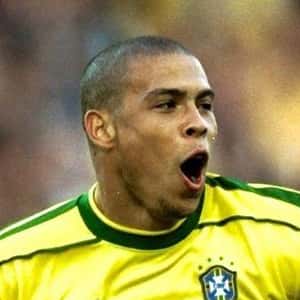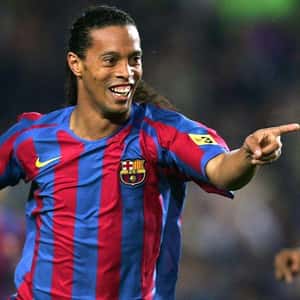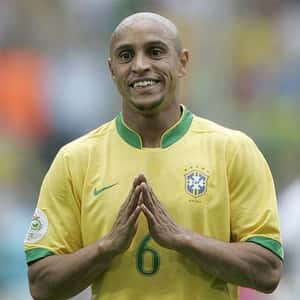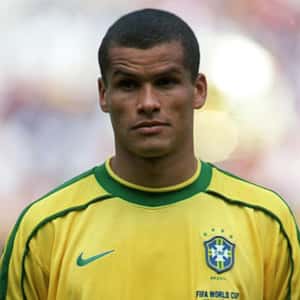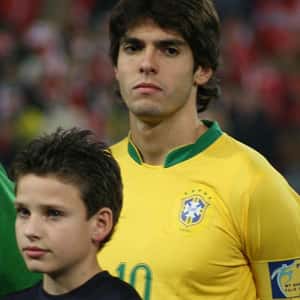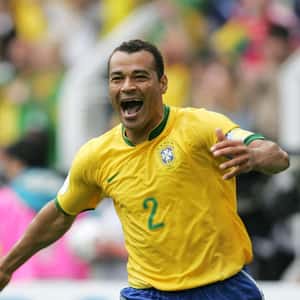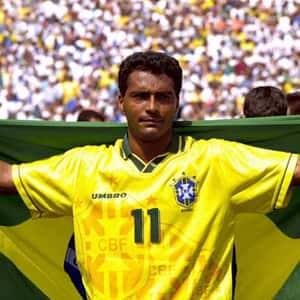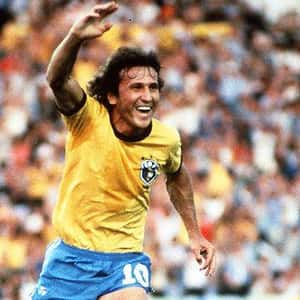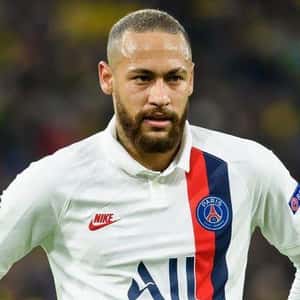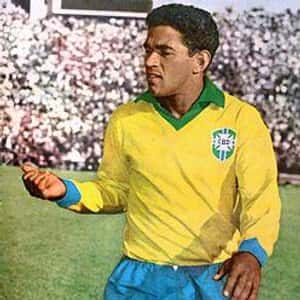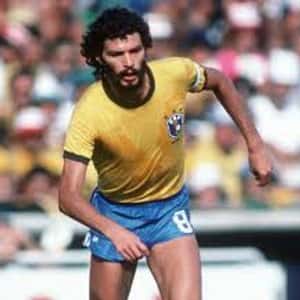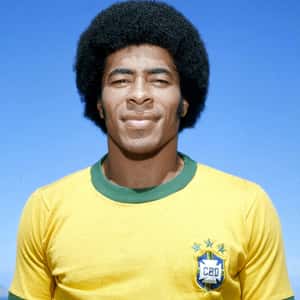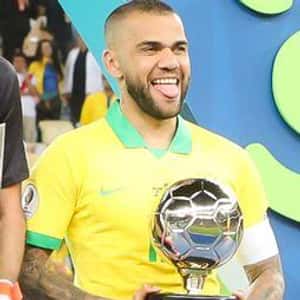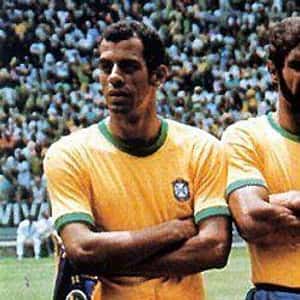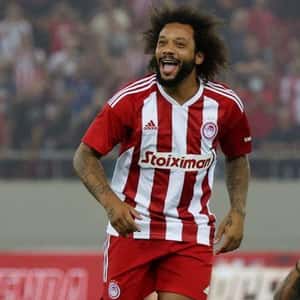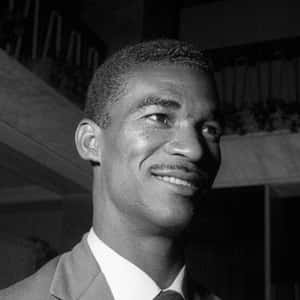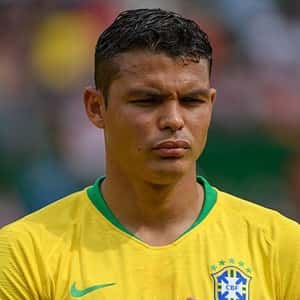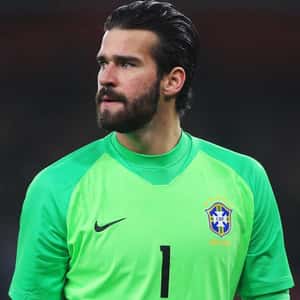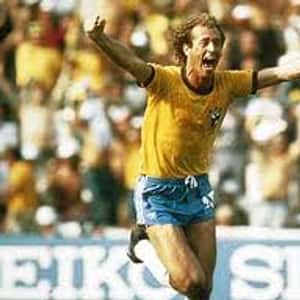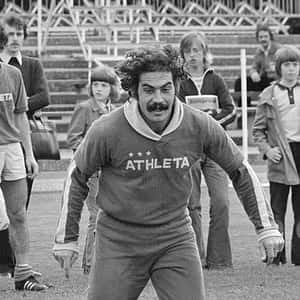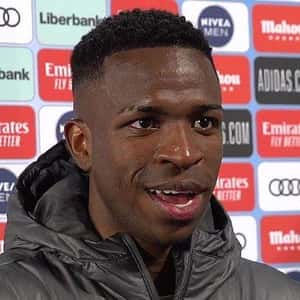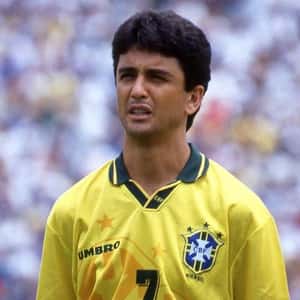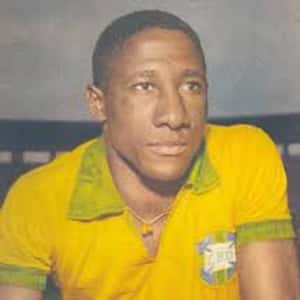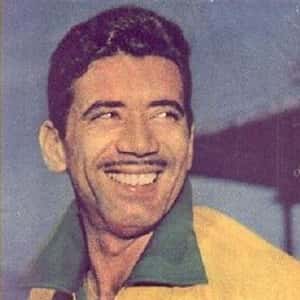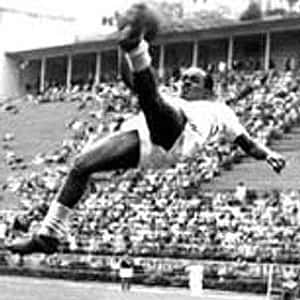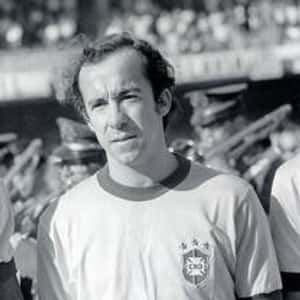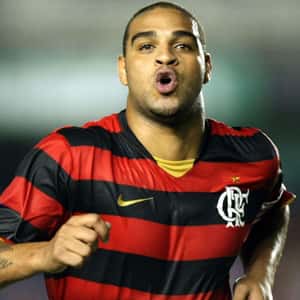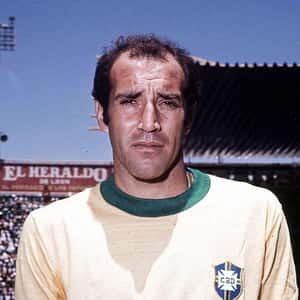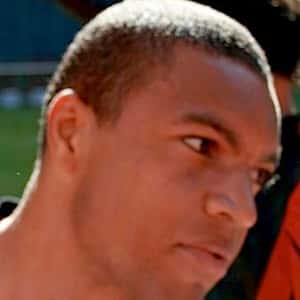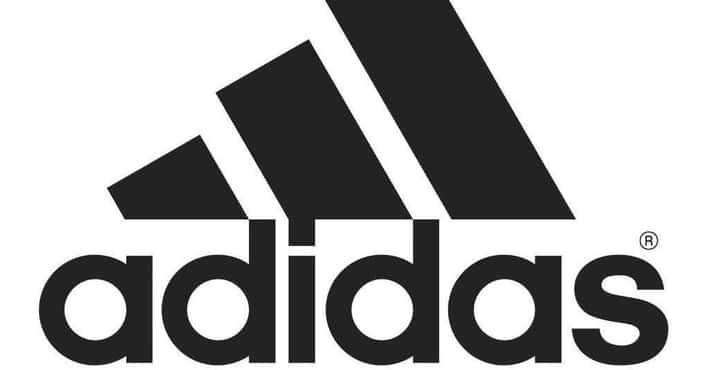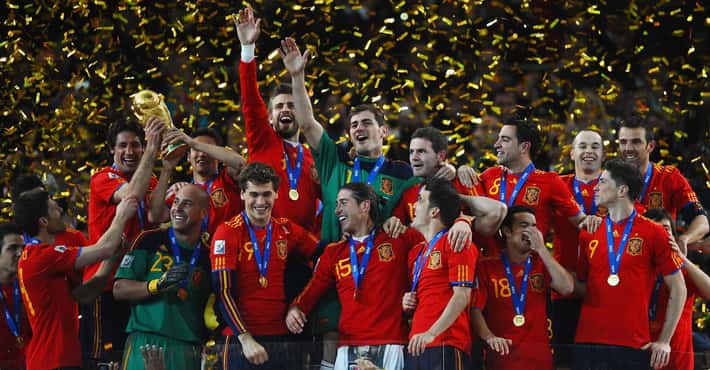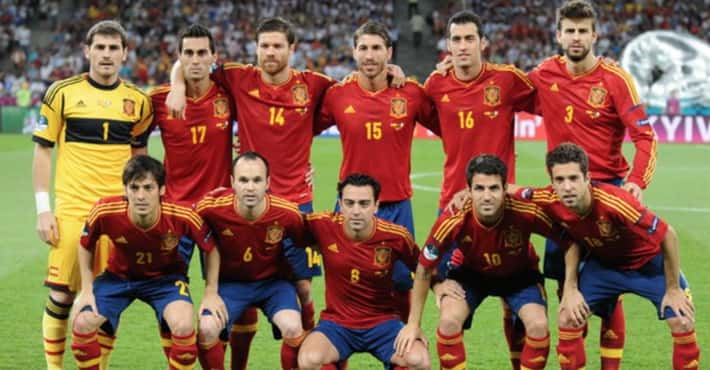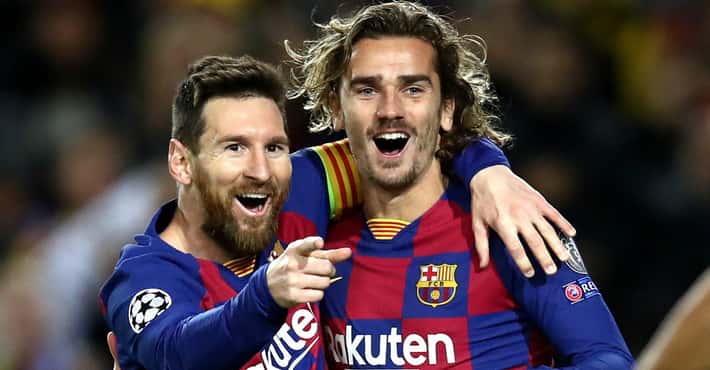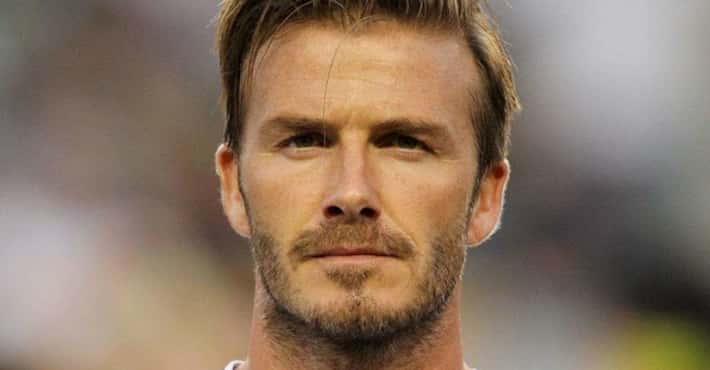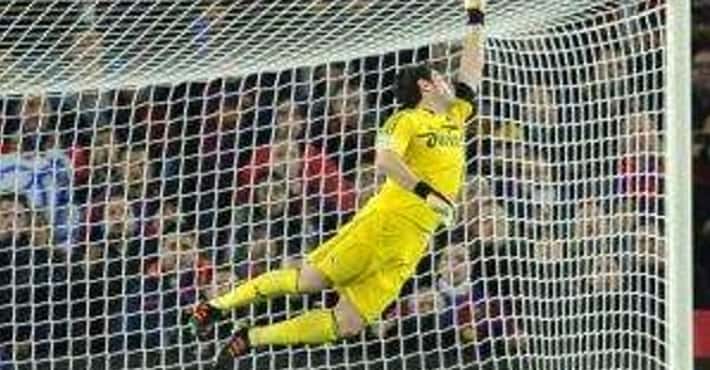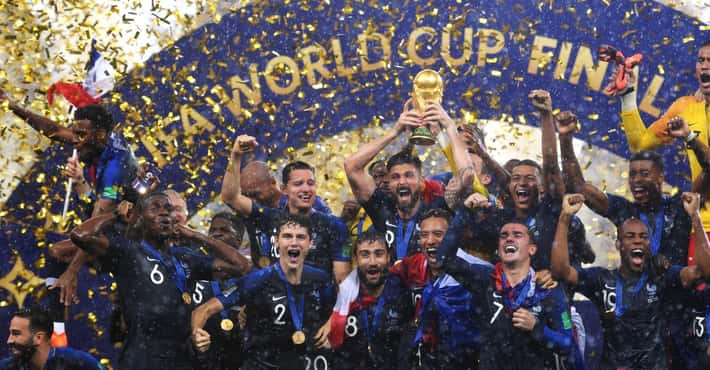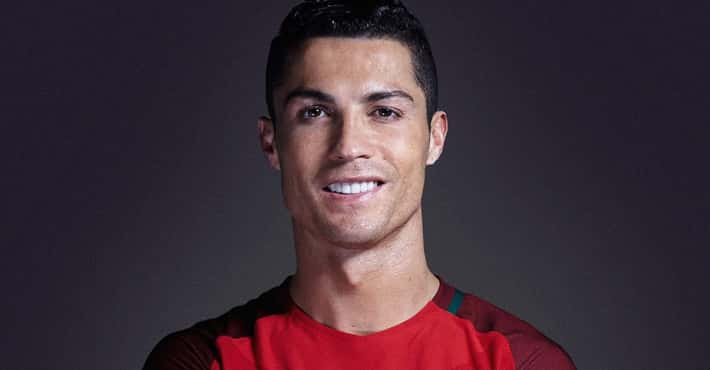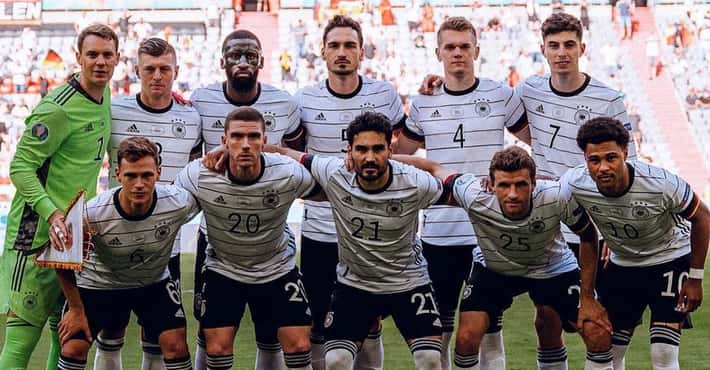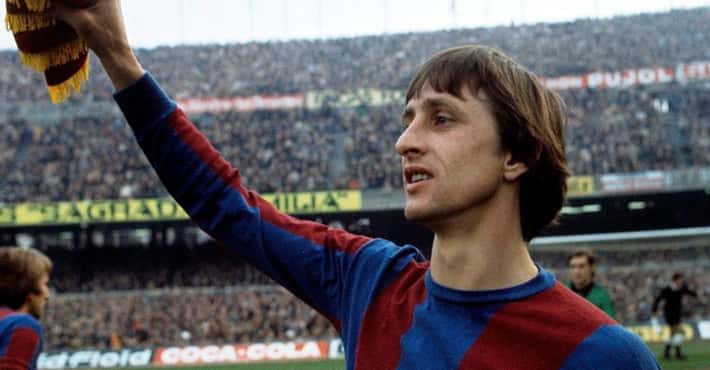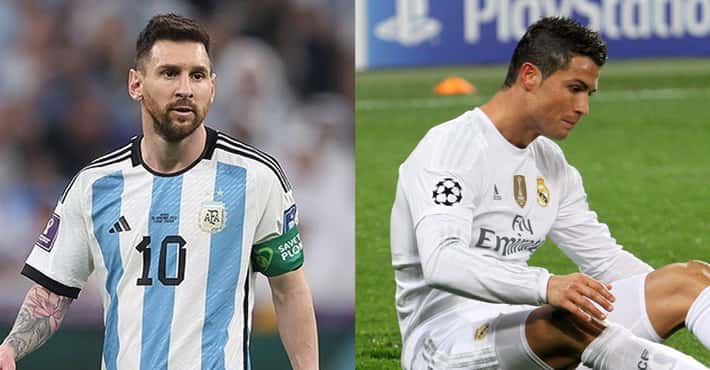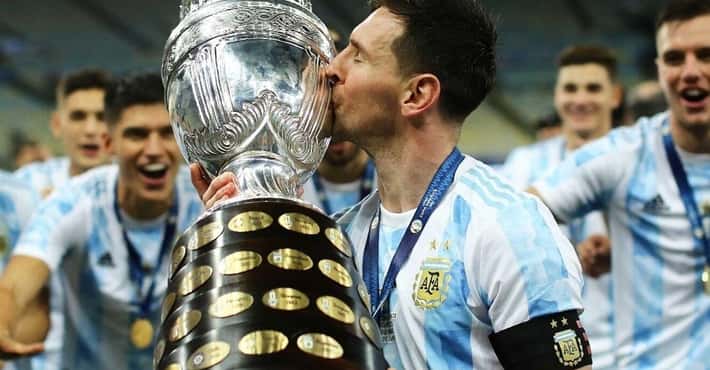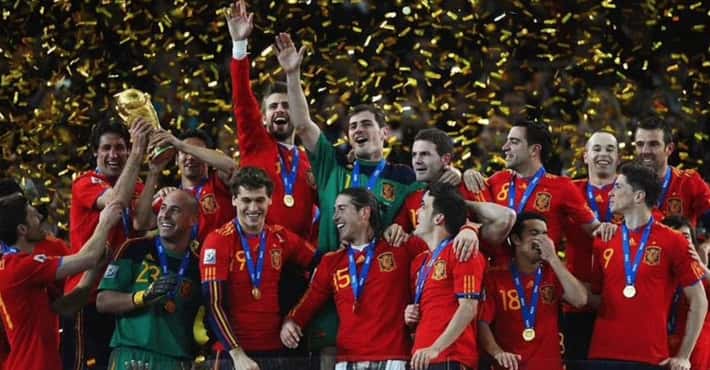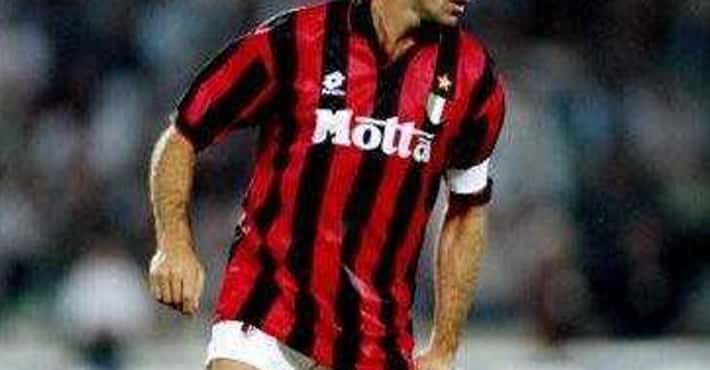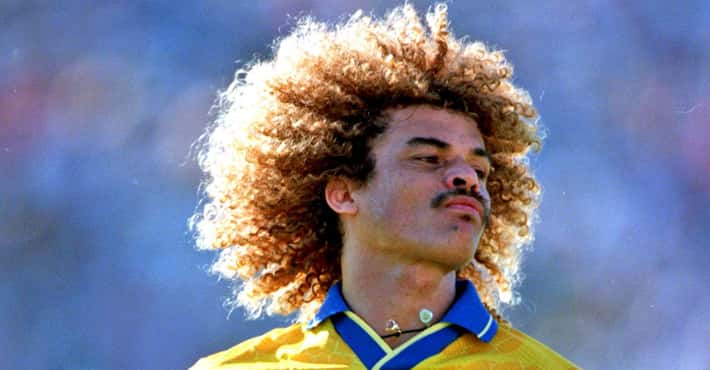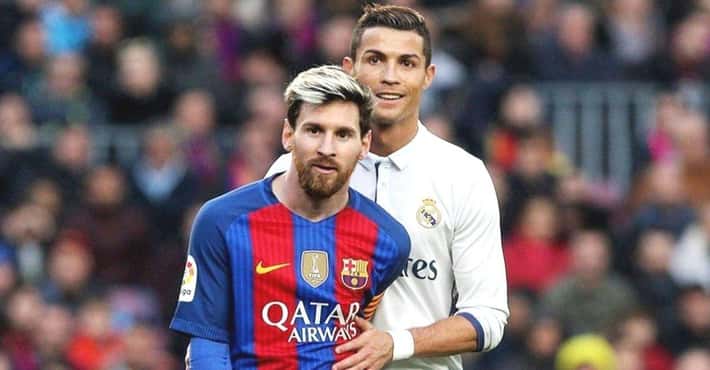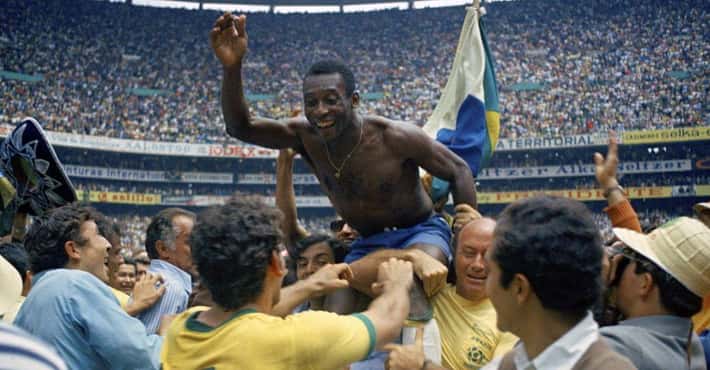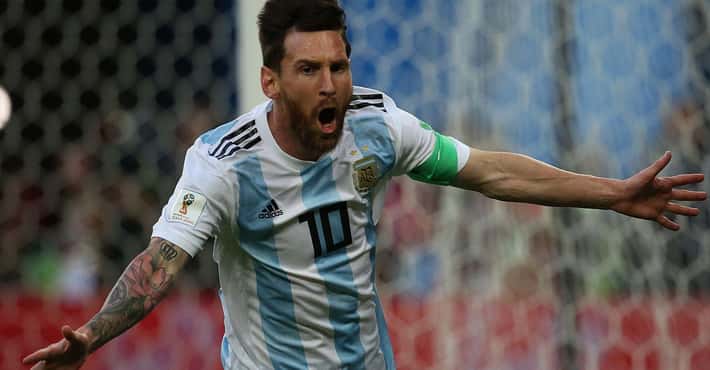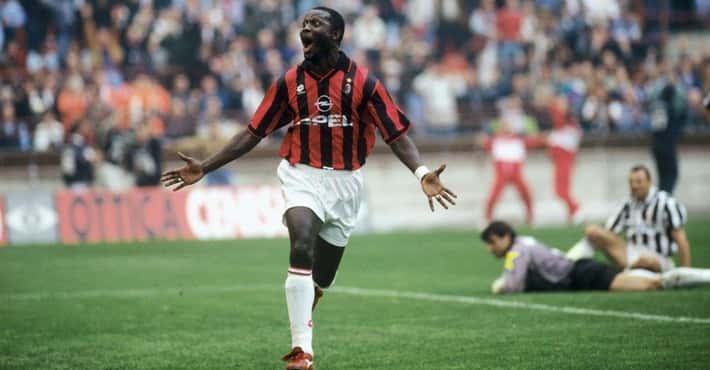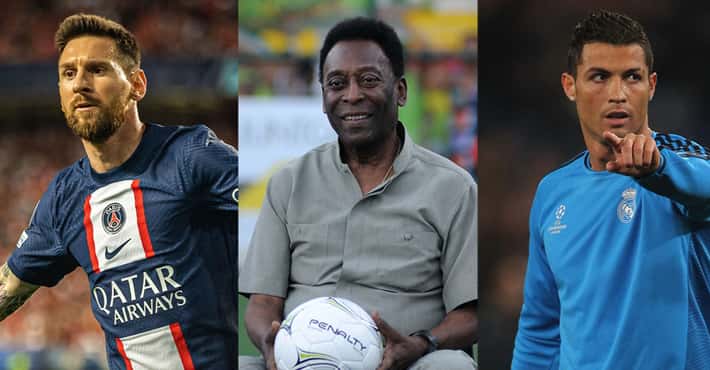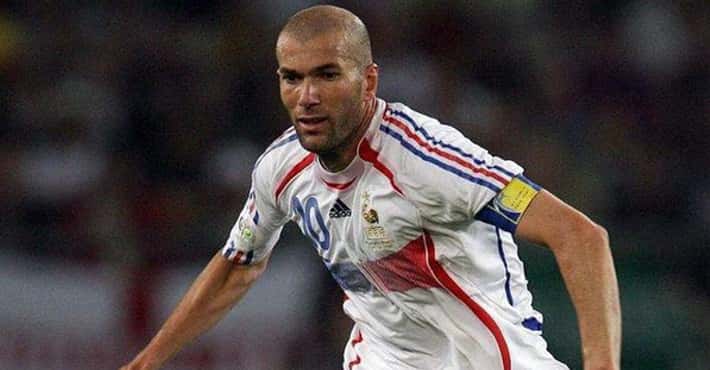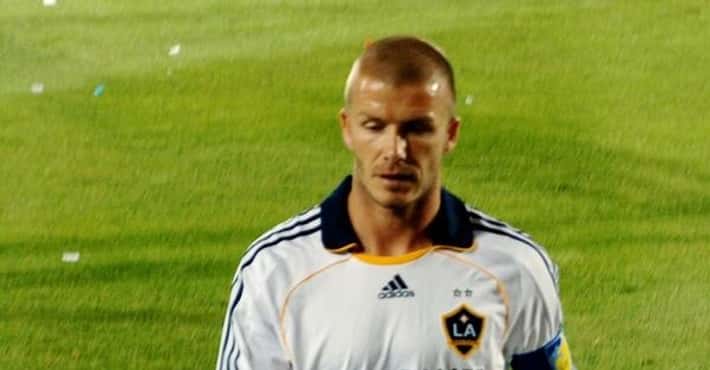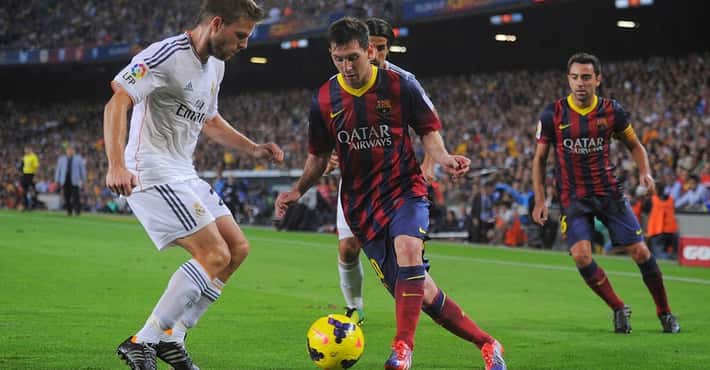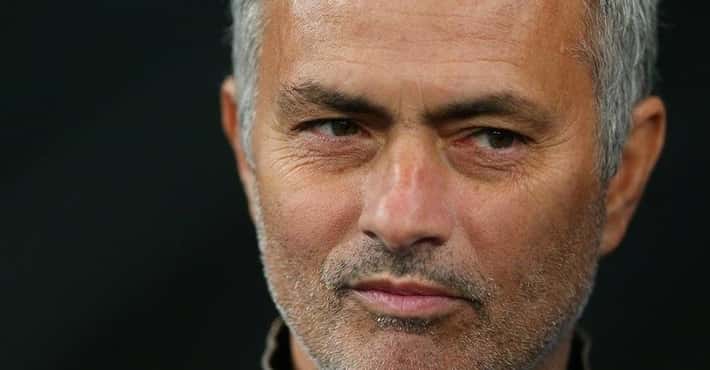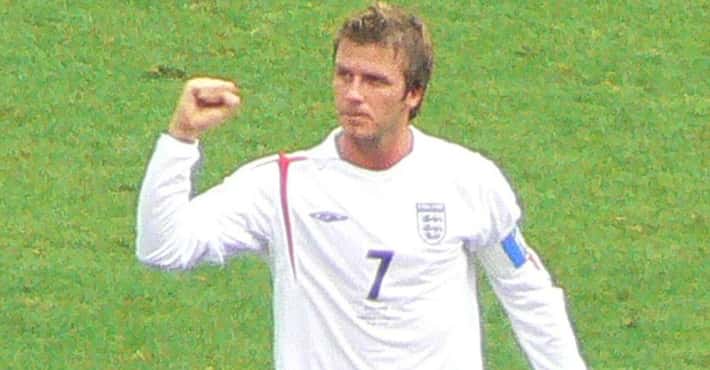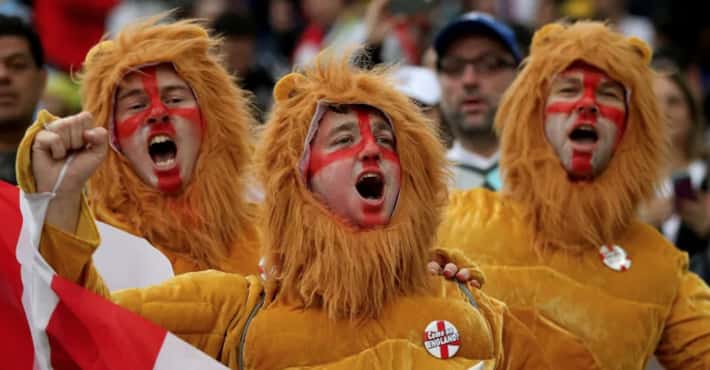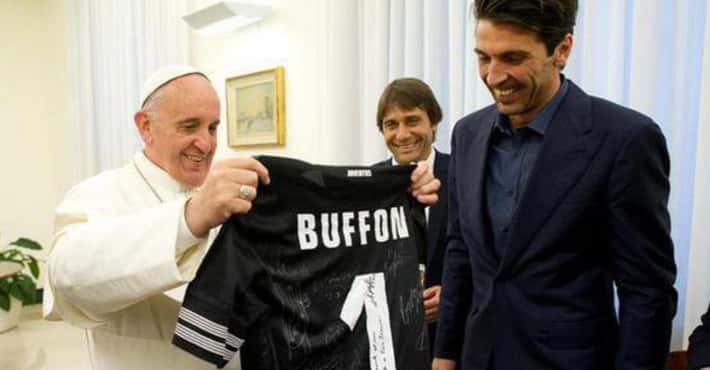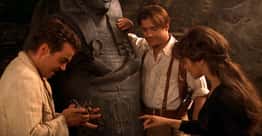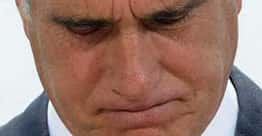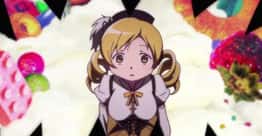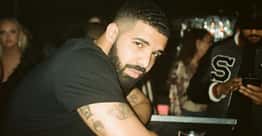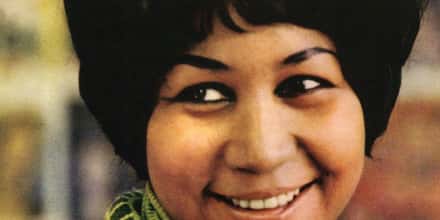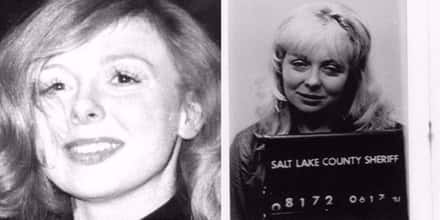The Best Soccer Players From Brazil
Ranked By
104.1K votes
11.8K voters
25 reranks
Voting Rules
Soccer players born in Brazil or who played on the Brazilian national team.
- Dec. at 82 (1940-2022)Edson Arantes do Nascimento, KBE (October 23, 1940– December 29, 2022), known as Pelé, was a Brazilian retired professional soccer player who played as a forward. He is widely regarded as one of the greatest players of all time. In 1999, he was voted World Player of the Century by the International Federation of Football History & Statistics (IFFHS), was one of the two joint winners of the FIFA Player of the Century award, and was elected Athlete of the Century by the International Olympic Committee. According to the IFFHS, Pelé is the most successful domestic league goal-scorer in football history scoring 650 goals in 694 League matches, and in total 1281 goals in 1363 games, which is a Guinness World Record. During his playing days, Pelé was for a period the best-paid athlete in the world. In Brazil, he is hailed as a national hero for his accomplishments in football and for his outspoken support of policies that improve the social conditions of the poor.More Pelé
- #10 of 283 onThe Best Soccer Players Of All Time
- #46 of 106 onWhich Big-Name Celebs Have The Least Expected Real Names?
- #454 of 3,183 onThe Most Influential People Of All Time
- Age: 47Ronaldo Luís Nazário de Lima (born 18 September 1976), commonly known as Ronaldo or Ronaldo Nazário, is a Brazilian business owner, president of La Liga club Real Valladolid, owner of Brasileiro Série B club Cruzeiro and a retired professional footballer who played as a striker. Popularly dubbed O Fenômeno ('The Phenomenon') and also nicknamed R9, he is widely considered as one of the greatest players of all time. As a multi-functional striker who brought a new dimension to the position, Ronaldo has been the influence for a generation of strikers that have followed. His individual accolades include being named FIFA World Player of the Year three times and winning two Ballon d'Or awards.More Ronaldo
- #4 of 283 onThe Best Soccer Players Of All Time
- #1 of 161 onThe Best Soccer Players of the '90s
- #88 of 1,269 onThe Best Athletes Of All Time
- Age: 44Ronaldo de Assis Moreira (born 21 March 1980), commonly known as Ronaldinho Gaúcho (Brazilian Portuguese: [ʁonawˈdʒĩɲu ga'uʃu]) or simply Ronaldinho, is a Brazilian former professional footballer and ambassador for Barcelona. He played mostly as an attacking midfielder, but was also deployed as a forward or a winger. He played the bulk of his career at European clubs Paris Saint-Germain, Barcelona and A.C. Milan as well as playing for the Brazilian national team. Often considered one of the best players of his generation and regarded by many as one of the greatest of all time, Ronaldinho won two FIFA World Player of the Year awards and a Ballon d'Or. He was renowned for his technical skills and creativity; due to his agility, pace and dribbling ability, as well as his use of tricks, feints, overhead kicks, no-look passes and accuracy from free-kicks. Ronaldinho made his career debut for Grêmio, in 1998. At age 20, he moved to Paris Saint-Germain in France before signing for Barcelona in 2003. In his second season with Barcelona, he won his first FIFA World Player of the Year award, as Barcelona won La Liga. The season that followed is considered one of the best in his career as he was instrumental in Barcelona winning the UEFA Champions League, their first in fourteen years, as well as another La Liga title, giving Ronaldinho his first career double. After scoring two spectacular solo goals in El Clásico, Ronaldinho became the second Barcelona player, after Diego Maradona in 1983, to receive a standing ovation from Real Madrid fans at the Santiago Bernabéu. Ronaldinho also received his second FIFA World Player of the Year award, as well as the Ballon d'Or. Following a second-place La Liga finish to rivals Real Madrid in the 2006–07 season and an injury plagued 2007–08 season, Ronaldinho departed Barcelona to join Milan. He then returned to Brazil to play for Flamengo in 2011 and Atlético Mineiro a year later where he won the Copa Libertadores, before moving to Mexico to play for Querétaro and then back to Brazil to play for Fluminense in 2015. Ronaldinho accumulated numerous other individual awards in his career. He was included in the UEFA Team of the Year and the FIFA World XI three times, named UEFA Club Footballer of the Year in 2006 and the South American Footballer of the Year in 2013, and was named in the FIFA 100, a list of the world's greatest living players compiled by Pelé. At international level, Ronaldinho played 97 matches for the Brazil national team, scoring 33 goals and representing his country in two FIFA World Cups. He was an integral part of the 2002 FIFA World Cup-winning team in Korea and Japan, starring alongside Ronaldo and Rivaldo in an attacking trio, scoring two goals, including a free-kick from 40 yards out against England, registering two assists and being named in the FIFA World Cup All-Star Team. As captain, he led Brazil to their second Confederations Cup title in 2005 and was named Man of the Match in the final. Ronaldinho scored three goals in the tournament, taking his total to nine, making him the competition's joint all-time leading goalscorer.More Ronaldinho
- Dig Deeper...250+ Famous Aries Celebrities
- #3 of 283 onThe Best Soccer Players Of All Time
- #23 of 118 onThe All Time Ugliest Athletes
- Age: 51Roberto Carlos da Silva Rocha (born 10 April 1973), more commonly known simply as Roberto Carlos, is a Brazilian retired professional footballer who now works as a football ambassador. He started his career in Brazil as a forward but spent most of his career as a left back and has been described as the "most offensive-minded left-back in the history of the game". Carlos is also widely considered one of the best left backs in history.At club level, he joined Real Madrid in 1996 where he spent 11 highly successful seasons, playing 584 matches in all competitions and scoring 71 goals. At Real, he won four La Liga titles and the UEFA Champions League three times. In April 2013, he was named by Marca as a member of the "Best Foreign Eleven in Real Madrid's History". In August 2012, he announced his retirement from football at the age of 39.Roberto Carlos started playing for the Brazil national team in 1992. He played in three World Cups, helping the team reach the final in 1998 in France, and win the 2002 tournament in Korea/Japan. He was named in the FIFA World Cup All-Star Team in 1998 and 2002. With 125 caps he has made the second most appearances for his national team.Roberto Carlos took up management and was named as the head coach of Sivasspor in the Turkish Süper Lig in June 2013. He resigned as head coach in December 2014. In July 2015, he was appointed player/manager of Indian Super League club Delhi Dynamos.He was nicknamed El Hombre Bala ("The Bullet Man") due to his powerful bending free kicks, which have been measured at over 105 miles per hour (169 km/h). He is also known for his stamina, running speed, technical skills, crossing ability, long throw ins and 24-inch (61 cm) thighs. In 1997, he was runner-up in the FIFA World Player of the Year. He was chosen on the FIFA World Cup Dream Team, and in 2004 was named by Pelé in the FIFA 100 list of the world's greatest living players.More Roberto Carlos
- #3 of 367 onThe Best Soccer Defenders of All Time
- #14 of 283 onThe Best Soccer Players Of All Time
- #3 of 161 onThe Best Soccer Players of the '90s
- Age: 52Rivaldo Vítor Barbosa Ferreira (born 19 April 1972), known as Rivaldo (Brazilian Portuguese: [ʁiˈvawdu]), is a Brazilian former professional footballer. He played mainly as an attacking midfielder but also as a second striker. Although predominantly left footed, he was capable of playing on either flank, and was on occasion deployed as a wide midfielder or as a winger.He spent five years with Spanish club Barcelona, where he formed a successful partnership with Patrick Kluivert, and won the 1998 and 1999 Spanish La Liga championship and the 1998 Copa del Rey. With 130 goals for Barcelona he is the club's ninth highest goalscorer. His three goals against Valencia in June 2001 which qualified Barcelona for the Champions League, the last goal of which was a last minute 20-yard bicycle kick winner, is often ranked the greatest hat-trick ever.From 1993 and 2003, Rivaldo played 74 matches and scored 35 goals for Brazil and is the seventh highest goalscorer. He helped Brazil reach the final of the 1998 FIFA World Cup, and won the 1999 Copa América where he was named player of the tournament. Rivaldo starred alongside Ronaldo and Ronaldinho in the 2002 FIFA World Cup winning team. He was named in the FIFA World Cup All-Star Team in 1998 and 2002. One of the most skillful and creative players of his generation, Rivaldo was renowned for his bending free kicks, bicycle kicks, powerful ball striking from distance, and ability to both score and create goals. In 1999, he won the Ballon d'Or and was named FIFA World Player of the Year. In 2004, he was named by Pelé in the FIFA 100 list of the world's greatest living players. He is an inductee to the Brazilian Football Museum Hall of Fame. In March 2014, Rivaldo announced his retirement from professional football, however since June 2015 he made appearances for Mogi Mirim. On August 14, 2015, he announced that the comeback was over and that he was retiring once again. In 2015, he acted in the Iranian-Brazilian film I Am Not Salvador. In 2018, Rivaldo was added as an icon to the FIFA video game FIFA 19.More Rivaldo
- #43 of 283 onThe Best Soccer Players Of All Time
- #7 of 161 onThe Best Soccer Players of the '90s
- #1149 of 1,269 onThe Best Athletes Of All Time
- Age: 42Ricardo Izecson dos Santos Leite (Brazilian Portuguese: [hiˈkaɾdu iˈzɛksõ duˈsɐ̃tus ˈlejt͡ʃi]), born 22 April 1982, commonly known as Kaká (Portuguese: [kaˈka] (listen)) or Ricardo Kaká, is a Brazilian retired professional footballer who played as an attacking midfielder. Owing to his performances at Milan where he was an elite playmaker, Kaká is widely considered one of the best players of his generation. With success at club and international level, he is one of eight players to have won the FIFA World Cup, the UEFA Champions League and the Ballon d'Or.Kaká made his professional club debut at age 18 at São Paulo in Brazil in 2001. After being named to the Bola de Ouro as the best player in the 2002 Campeonato Brasileiro, he joined Serie A club Milan for a fee of €8.5 million in 2003. In Italy, Kaká won a league title and was named the Serie A Footballer of the Year twice. In 2005, Milan finished runners up in the 2005 UEFA Champions League Final with Kaká as the top assist provider of the tournament, and named the UEFA Club Midfielder of the Year. Two years later, he led Milan to win the 2007 UEFA Champions League Final and was the tournament's top goal scorer. Kaká's pace, creative passing, goal scoring and dribbles from midfield saw him win the FIFA World Player of the Year, the Ballon d'Or, the UEFA Club Footballer of the Year and the IFFHS World's Best Playmaker awards. After his success with Milan, Kaká joined Real Madrid for a transfer fee of €67 million. At the time, this was the second highest transfer fee (in euros) ever, behind only the €77.5 million (150 billion lire) fee for Zinedine Zidane. However, after four injury ravaged seasons in Spain, which saw his physical ability to dribble from midfield rapidly decline, he returned to Milan for a single season in 2013, prior to joining MLS expansion club Orlando City. He initially returned to his former club São Paulo on loan, before relocating to the United States in 2015, where he became a three time All-Star and won an MLS All-Star Game Most Valuable Player award prior to retiring in 2017. Kaká made his debut for the Brazil national team in 2002, and was selected for their victorious World Cup squad that year, as well as the 2006 and 2010 tournaments, leading the latter tournament in assists. He was also a member of Brazil's 2005 and 2009 FIFA Confederations Cup-winning squads, winning the Golden Ball Award in 2009 as the tournament's best player. In addition to his individual awards, between 2006 and 2009 he was named in both the FIFA World XI and the UEFA Team of the Year three times. In 2010, he was named in the A.C. Milan Hall of Fame. One of the world's most famous athletes, Kaká was the first sportsperson to amass 10 million followers on Twitter. Off the field, Kaká is known for his humanitarian work, where he became the youngest ambassador of the UN World Food Programme in 2004. For his contributions on and off the pitch, Kaká was listed by Time as one of the world's most influential people in 2008 and 2009.More Kaká
- #83 of 283 onThe Best Soccer Players Of All Time
- #1095 of 1,269 onThe Best Athletes Of All Time
- #8 of 90 onThe Greatest South American Footballers of All Time
- Age: 53Marcos Evangelista de Morais (born 7 June 1970), known as Cafu [kaˈfu], is a Brazilian former professional footballer who played as a defender. With 142 appearances for the Brazil national team, he is the most internationally capped Brazilian player of all time. He represented his nation in four FIFA World Cups between 1994 and 2006, and is the only player to have appeared in three consecutive World Cup finals, winning the 1994 and 2002 editions of the tournament, the latter as his team's captain where he lifted the World Cup trophy. With Brazil, he also took part in four editions of the Copa América, winning the title twice, in 1997 and 1999; he was also a member of the national side that won the 1997 FIFA Confederations Cup. At club level, Cafu won several domestic and international titles while playing in Brazil, Spain and Italy; he is best known for his spells at São Paulo, Roma and Milan, teams with which he made history, although he also played for Real Zaragoza, Juventude and Palmeiras throughout his career. Known for his pace and energetic attacking runs along the right flank, he is regarded as one of the greatest full-backs of all time, one of the best defenders ever to play in the Italian Serie A, and as one of the greatest Brazilian and South American players of his generation. In 1994, he was named South American Footballer of the Year, and in 2004, he was named by Pelé in the FIFA 100 list of the world's greatest living players. In 2005 he was named in the FIFA World XI.More Cafu
- #9 of 367 onThe Best Soccer Defenders of All Time
- #28 of 283 onThe Best Soccer Players Of All Time
- #10 of 161 onThe Best Soccer Players of the '90s
- Age: 58Romário de Souza Faria (born 29 January 1966), known simply as Romário (Brazilian Portuguese: [ʁoˈmaɾiu]), is a Brazilian politician who previously achieved worldwide fame as a professional footballer. A prolific striker renowned for his clinical finishing, he is regarded as one of the greatest players of all time. Romário starred for Brazil in their 1994 FIFA World Cup success, receiving the FIFA Golden Ball as player of the tournament. He was named FIFA World Player of the Year the same year. He came fifth in the FIFA Player of the Century internet poll in 1999, was elected to the FIFA World Cup Dream Team in 2002, and was named in the FIFA 100 list of the world's greatest living players in 2004.At club level, after developing his early career in Brazil, Romário moved to PSV Eindhoven in the Netherlands in 1988. During his five seasons at PSV the club became Eredivisie champions three times, and he scored a total of 165 goals in 167 games. In 1993, he moved to FC Barcelona and became part of Johan Cruyff's "Dream Team", forming an exceptional strike partnership with Hristo Stoichkov. He won La Liga in his first season and finished top goalscorer with 30 goals in 33 matches. During the second half of his career Romário played for clubs within the city of Rio de Janeiro in Brazil. He won the Brazilian league title with CR Vasco da Gama in 2000 and was a three-time top scorer in the league. At the end of his career he also played briefly in Qatar, the United States and Australia. Considered a master of the confined space of the penalty area, his rapid speed over short distances (aided by his low centre of gravity) took him away from defenders, and he was renowned for his trademark toe-poke finish. With 55 goals in 70 appearances for Brazil, Romário is the fourth-highest goalscorer for his national team, behind Pelé, Ronaldo and Neymar. He is second on the all-time list of Brazilian league's top scorers with 154 goals. While finishing as a top goalscorer in many different competitions, he is one of very few strikers to surpass the mark of 1,000 goals, and is the second-most prolific goalscorer in the history of football.More Romário
- #41 of 283 onThe Best Soccer Players Of All Time
- #11 of 161 onThe Best Soccer Players of the '90s
- #1114 of 1,269 onThe Best Athletes Of All Time
- Age: 71Arthur Antunes Coimbra (Portuguese pronunciation: [aʁˈtuʁ ɐ̃ˈtũnis koˈĩbɾɐ], born 3 March 1953 in Rio de Janeiro), better known as Zico ([ˈziku]), is a Brazilian coach and former footballer, who played as an attacking midfielder. Often called the "White Pelé", he was a creative playmaker, with excellent technical skills, vision, and an eye for goal, who is considered one of the most clinical finishers and best passers ever, as well as one of the greatest players of all time. Arguably the world's best player of the late 1970s and early 80s, he is regarded as one of the best playmakers and free kick specialists in history, able to bend the ball in all directions. In 1999, Zico came eighth in the FIFA Player of the Century grand jury vote, and in 2004 was named in the FIFA 100 list of the world's greatest living players. According to Pelé, considered one of the best players ever, "throughout the years, the one player that came closest to me was Zico".With 48 goals in 71 official appearances for Brazil, Zico is fifth highest goalscorer for his national team. He represented them in the 1978, 1982 and 1986 World Cups. They did not win any of those tournaments, even though the 1982 squad is considered one of the greatest Brazilian national squads ever. Zico is often considered one of the best players in football history not to have been on a World Cup winning squad. He was chosen as the 1981 and 1983 Player of the Year. Zico has coached the Japanese national team, appearing in the 2006 FIFA World Cup and winning the Asian Cup 2004, and Fenerbahçe, who were a quarter-finalist in 2007–08 in the Champions League under his command. He was announced as the head coach of CSKA Moscow in January 2009. On 16 September 2009, Zico was signed by Greek side Olympiacos for a two-year contract after the club's previous coach, Temuri Ketsbaia, was sacked. He was fired four months later, on 19 January 2010. He currently works as technical director at Kashima Antlers.More Zico
- #112 of 283 onThe Best Soccer Players Of All Time
- #1125 of 1,269 onThe Best Athletes Of All Time
- #10 of 90 onThe Greatest South American Footballers of All Time
- Age: 32Neymar da Silva Santos Júnior (born 5 February 1992), commonly known as Neymar Jr. or simply Neymar, is a Brazilian professional footballer who plays as a forward for French club Paris Saint-Germain and the Brazil national team. Considered one of the best players in the world, he is known for his dribbling, finishing, skill, pace, and ability to play with both feet. Neymar came into prominence at an early age at Santos, where he made his professional debut aged 17. He helped the club win two successive Campeonato Paulista championships, a Copa do Brasil, and the 2011 Copa Libertadores, with the latter Santos' first since 1963. Neymar was twice named the South American Footballer of the Year, in 2011 and 2012, and soon relocated to Europe to join Barcelona. As part of Barça's attacking trio with Lionel Messi and Luis Suárez, he won the continental treble of La Liga, the Copa del Rey, and the UEFA Champions League, and came third for the FIFA Ballon d'Or in 2015 for his performances. He then attained a domestic double in the 2015–16 season. In 2017, Neymar transferred from Barcelona to Paris Saint-Germain in a move worth €222 million, making him the most expensive player ever. In France, he won two league titles, a Coupe de France, and a Coupe de la Ligue, which included a domestic treble and being voted Ligue 1 Player of the Year, in his debut season. Neymar's second season with PSG was heavily injury-riddled and marked by controversies.With 60 goals in 97 matches for Brazil since debuting at age 18, Neymar is the third highest goalscorer for his national team, trailing only Pelé and Ronaldo. He was a key player in Brazil's victories at the 2011 South American Youth Championship, where he finished as leading goalscorer, and the 2013 FIFA Confederations Cup, where he won the Golden Ball as player of the tournament. His participation in the 2014 FIFA World Cup and 2015 Copa América was cut short by injury and a suspension, respectively, but, the following year, he captained Brazil to their first Olympic gold medal in men's football at the 2016 Summer Olympics, and two years later, featured at the 2018 FIFA World Cup. Off the pitch, Neymar ranks among the world's most prominent sportsmen; SportsPro named him the most marketable athlete in the world in 2012 and 2013, and ESPN cited him as the world's fourth-most famous athlete in 2016. In 2017, Neymar was listed by Time to be one of the most influential people in the world, and in 2019, Forbes ranked him the world's third highest-paid athlete (after Messi and Cristiano Ronaldo).More Neymar
- #8 of 283 onThe Best Soccer Players Of All Time
- #5 of 296 onThe Best Current Soccer Players
- #734 of 1,269 onThe Best Athletes Of All Time
- Dec. at 49 (1933-1983)Manuel Francisco dos Santos (28 October 1933 – 20 January 1983), nicknamed Mané Garrincha, best known as simply Garrincha (Portuguese pronunciation: [ɡaˈʁĩʃɐ], "little bird"), was a Brazilian footballer who played as a right winger. He is widely regarded as one of the greatest dribblers of all time. Garrincha is also widely regarded as a legendary figure in the sport.Garrincha played a vital role in Brazil's 1958 and 1962 World Cup victories. In 1962, when Pelé got injured, Garrincha led Brazil to a World Cup victory with a dominating performance throughout the tournament. He also became the first player to win Golden Ball (Player of the tournament), Golden Boot (Leading Goalscorer) and the World Cup in the same tournament. He was also named in the World Cup All-Star Team's of both 1958 World Cup and 1962 World Cup. In 1994, he was named in the FIFA World Cup All-Time Team. Brazil never lost a match while fielding both Garrincha and Pelé. In 1999, he came seventh in the FIFA Player of the Century grand jury vote. He is a member of the World Team of the 20th Century, and was inducted into the Brazilian Football Hall of Fame. Due to his immense popularity in Brazil, he was also called Alegria do Povo (People's Joy) and Anjo de Pernas Tortas (Bent-Legged Angel).At club level, Garrincha played the majority of his professional career for the Brazilian team Botafogo. In the Maracanã, the home team room is known as "Garrincha". In the capital Brasília, the Estádio Nacional Mané Garrincha is named after him. He is credited for inspiring the first bullfighting chants of olé to be used at football grounds.More Garrincha
- #182 of 283 onThe Best Soccer Players Of All Time
- #1241 of 3,183 onThe Most Influential People Of All Time
- #1087 of 1,269 onThe Best Athletes Of All Time
- Dec. at 57 (1954-2011)Sócrates Brasileiro Sampaio de Souza Vieira de Oliveira, MD (19 February 1954 – 4 December 2011), simply known as Sócrates, was a Brazilian footballer who played as an attacking midfielder. His medical degree and his political awareness, combined with style and quality of his play, earned him the nickname "Doctor Socrates". Easily recognizable for his beard and headband, Sócrates became the "symbol of cool for a whole generation of football supporters". He is considered to be one of the greatest midfielders ever to play the game. In 1983, he was named South American Footballer of the Year. In 2004, he was named by Pelé in the FIFA 100 list of the world's greatest living players.Socrates played for Brazil for seven years, scoring 22 goals and representing the nation in two World Cups. He captained the team in the 1982 FIFA World Cup; playing in midfield alongside Zico, Falcão and Éder, considered one of the greatest Brazilian national teams ever. He also appeared in the 1979 and 1983 Copa América. At club level, Sócrates played for Botafogo-SP before joining Corinthians in 1978. He moved to Italy to play for Fiorentina, returning to Brazil in 1985 to end his career.More Sócrates
- #88 of 283 onThe Best Soccer Players Of All Time
- #1145 of 1,269 onThe Best Athletes Of All Time
- #16 of 90 onThe Greatest South American Footballers of All Time
- Age: 79Jair Ventura Filho (born 25 December 1944), better known as Jairzinho, is a retired Brazilian footballer. A quick, skillful, and powerful right winger, known for his finishing ability and eye for goal, he was a member of the legendary Brazilian national team that won the 1970 FIFA World Cup. A versatile forward, he was also capable of playing in a variety of other attacking positions, as a main striker, second striker, or even as an attacking midfielder. Due to the economic and political situation of the time, as well as the Sport Legislation, he played most of his club football in South America where he spent eleven years at Rio de Janeiro club Botafogo. He went on to play in Europe during the final years of his career, a common pattern for South American players until the 1980s, when the economic and political situation changed. Jairzinho replaced his footballing idol Garrincha in both the Botafogo and Brazil teams, and played in three consecutive World Cups: 1966, 1970 and 1974. Regarded as one of Brazil's best players ever, and as one of the greatest players of all time, he was listed one place ahead of Zinedine Zidane, at number 27 in World Soccer Magazine's list of the 100 greatest players of the 20th century.More Jairzinho
- #130 of 283 onThe Best Soccer Players Of All Time
- #911 of 1,269 onThe Best Athletes Of All Time
- #30 of 90 onThe Greatest South American Footballers of All Time
- Age: 40Daniel Alves da Silva (born 6 May 1983) is a Brazilian professional footballer who plays as a right-back for Liga MX side UNAM (nicknamed Pumas) and the Brazil national team. He is the most decorated player in the history of football with over 40 trophies, with also being the second most decorated defender of all time in European competitions with nine European medals, leaving him equal with Paolo Maldini on the all-time list.Before joining Barcelona in 2008, Alves spent a successful six-year spell with Sevilla, winning two UEFA Cups and the Copa del Rey with the Andalusian side.More Daniel Alves
- #17 of 367 onThe Best Soccer Defenders of All Time
- #100 of 283 onThe Best Soccer Players Of All Time
- #72 of 296 onThe Best Current Soccer Players
- Age: 79Carlos Alberto "Capita" Torres (17 July 1944 – 25 October 2016), also known as "O Capitão do Tri", was a Brazilian footballer. He is widely regarded as one of the best defenders of all time. He captained the Brazil national team to victory in the 1970 World Cup, scoring the fourth goal in the final, considered one of the greatest goals in the history of the tournament.Carlos Alberto was a member of the World Team of the 20th Century, and in 2004 was named by Pelé in the FIFA 100 list of the world's greatest living players. He was an inductee to the Brazilian Football Museum Hall of Fame, and was a member of the U.S. National Soccer Hall of Fame. In January 2013, Carlos Alberto was named one of the six Ambassadors of 2014 FIFA World Cup in Brazil, others being Ronaldo, Bebeto, Mário Zagallo, Amarildo and Marta.
- #175 of 367 onThe Best Soccer Defenders of All Time
- #47 of 283 onThe Best Soccer Players Of All Time
- #1161 of 1,269 onThe Best Athletes Of All Time
- Age: 35Marcelo Vieira da Silva Júnior (born 12 May 1988), known as Marcelo, is a Brazilian professional footballer who plays as a left-back for Super League Greece club Olympiacos. Known for his offensive capabilities, trickery, and technical qualities, Marcelo is often regarded as one of the greatest left-backs of all time. He has spent most of his career with Spanish club Real Madrid and is the club's most decorated player, with 25 trophies won.More Marcelo Vieira
- #26 of 367 onThe Best Soccer Defenders of All Time
- #94 of 283 onThe Best Soccer Players Of All Time
- #103 of 296 onThe Best Current Soccer Players
- Dec. at 72 (1928-2001)Didi (Portuguese pronunciation: [dʒiˈdʒi]), popular nickname for Waldyr Pereira (8 October 1928 – 12 May 2001), was a Brazilian footballer who played as a midfielder or as a forward. He played in three FIFA World Cups (1954, 1958, and 1962), winning the latter two and was awarded the Golden Ball, given to the tournament's best player, for his performance at the 1958 competition. An elegant player, Didi is considered to be one of the greatest midfielders in the history of the sport, and was renowned for his range of passing, stamina and technique; he was nicknamed the "Ethiopian Prince" throughout his career. A dead-ball specialist, he became famous for inventing the folha seca (dry leaf) free kicks, notably used by modern-day players such as Ronaldinho and Juninho, where the ball would swerve downward unexpectedly at a point resulting in a goal.
- Age: 39Thiago Emiliano da Silva (born 22 September 1984) is a Brazilian professional footballer who plays as a centre-back for Premier League club Chelsea and captains the Brazil national team. Silva made his senior international debut for Brazil in 2008, at age 23, and has since earned over 100 caps, including appearing in seven major tournaments. He won a bronze medal in the 2008 Olympics and a silver medal at the 2012 Olympics, and later served as captain as Brazil won the 2013 FIFA Confederations Cup and finished fourth at the 2014 FIFA World Cup. Silva later helped his country win the 2019 Copa América.More Thiago Silva
- #23 of 367 onThe Best Soccer Defenders of All Time
- #51 of 283 onThe Best Soccer Players Of All Time
- #33 of 296 onThe Best Current Soccer Players
- 19
Alisson
Age: 31Alisson Ramses Becker (born 2 October 1992), commonly known as Alisson, is a Brazilian professional footballer who plays as a goalkeeper for Premier League club Liverpool and the Brazil national team. In 2019, he was named The Best FIFA Goalkeeper and was also the recipient of the inaugural Yashin Trophy.More Alisson Becker- #138 of 283 onThe Best Soccer Players Of All Time
- #9 of 159 onThe Best Soccer Goalies of All Time
- #2 of 98 onThe Best Goalies In The World Right Now
- Age: 70Paulo Roberto Falcão, or simply Falcão (Portuguese pronunciation: [ˈpawlu ʁoˈbɛʁtu fawˈkɐ̃w̃]; born 16 October 1953), is a Brazilian former footballer and football manager. He is widely considered one of the best players in Internacional and Roma history playing also for São Paulo, and he is universally considered one of the greatest Brazilian players of all time, especially at his peak in the 1980s. At one stage, he was the world's highest paid footballer. Due to his success and performances with Roma, he earned the nickname "the eighth King of Rome" from the fans, and was inducted into the A.S. Roma Hall of Fame in 2013.For the Brazil national team, Falcão was capped 34 times between February 1976 and June 1986. He appeared at the 1982 FIFA World Cup, playing in midfield alongside Zico, Sócrates and Éder, considered one of the greatest Brazilian national teams ever. He was named by Pelé one of the 125 Greatest Living Footballers at a FIFA Awards ceremony in 2004. His last name, Falcão, was chosen by Radamel García, a retired footballer and father of Radamel Falcao, to name his son as a tribute to him.
- Age: 78Roberto Rivellino (also Rivelino, Brazilian Portuguese: [ʁoˈbɛʁtu ʁiveˈlĩnu]; Italian: [roˈbɛrto rivelˈlino]; born 1 January 1946) is a former Brazilian professional footballer. He was one of the stars of Brazil's 1970 FIFA World Cup winning team. Rivellino currently works as a pundit for Brazilian TV Cultura.The son of Italian immigrants from Macchiagodena (Isernia), he was famous for his large moustache, bending free kicks, long range shooting, accurate long passing, vision, close ball control and dribbling skills. He also perfected a football move called the "flip flap", famously copied by Romário, Mágico González, Ronaldo, Ronaldinho and Cristiano Ronaldo in recent years. A former attacking midfielder, he is widely regarded as one of the most graceful football players ever, and among the best midfielders of his generation. With the close control, feints and ability with his left foot, Diego Maradona named Rivellino among his greatest inspirations growing up. In 2004, he was named by Pelé in the FIFA 100 list of the world's greatest living players.More Roberto Rivelino
- #146 of 283 onThe Best Soccer Players Of All Time
- #576 of 1,269 onThe Best Athletes Of All Time
- #29 of 90 onThe Greatest South American Footballers of All Time
- Vinícius José Paixão de Oliveira Júnior (born 12 July 2000), commonly known as Vinícius Júnior or Vini Jr., is a Brazilian professional footballer who plays as a winger for Spanish club Real Madrid and the Brazil national team. Born in the São Gonçalo, Vinícius began his professional career at Flamengo, where he made his senior debut in 2017, at age 16. A few weeks later, Vinícius was the subject of a transfer to La Liga club Real Madrid, for whom he signed for in a national record for an U-18 player, R$191 million (€45 million) deal, which was made effective after his 18th birthday.More Vinícius Júnior
- #11 of 296 onThe Best Current Soccer Players
- #3 of 97 onThe Best Soccer Players Of 2024, Ranked
- #5 of 227 onThe Best Champions League Soccer Players Right Now
- Age: 60José Roberto Gama de Oliveira (born 16 February 1964), known as Bebeto, is a Brazilian former professional football player who played as a forward. He entered politics in the 2010 Brazilian General Elections and was elected to the Legislative Assembly of Rio de Janeiro representing the Democratic Labour Party. With 39 goals in 75 appearances for Brazil, Bebeto is the sixth highest goalscorer for his national team. He was the top scorer for Brazil at the 1989 Copa América when they won the tournament. At the 1994 FIFA World Cup, he formed a formidable strike partnership with Romário to lead Brazil to a record fourth World Cup title. He also generated headlines at the tournament for his goal celebration where he began rocking an imaginary baby after scoring against the Netherlands; his wife had given birth to their third child just days before. He was also a member of the Brazilian team that won the 1997 FIFA Confederations Cup, while he won Olympic silver and bronze medals with Brazil at the 1988 and 1996 Summer Olympic Games respectively. In 1989, Bebeto was named South American Footballer of the Year. In January 2013 and August 2014, Bebeto was named as one of the six Ambassadors of the 2014 FIFA World Cup and Rio 2016 in Brazil, others being Ronaldo, Amarildo, Marta, Carlos Alberto Torres, Mário Zagallo. His son, Mattheus, is a professional footballer.More Bebeto
- #137 of 283 onThe Best Soccer Players Of All Time
- #55 of 161 onThe Best Soccer Players of the '90s
- #22 of 90 onThe Greatest South American Footballers of All Time
- Dec. at 84 (1929-2013)Djalma Pereira Dias dos Santos known simply as Djalma Santos (Brazilian Portuguese: [diˈʒawmɐ ˈsɐ̃tus]; also spelled Dejalma Santos), (27 February 1929 – 23 July 2013) was a Brazilian footballer who started for the Brazil national team in four World Cups, winning two, in 1958 and 1962. Santos is considered to be one of the greatest right-backs of all time. While primarily known for his defensive skills, he often ventured upfield and displayed some impressive technical and attacking skills.Along with Franz Beckenbauer and Philipp Lahm, he is one of only three players to be included into three FIFA World Cup All Star teams (in 1954, 1958 and 1962). He was unrelated to his frequent defensive partner Nilton Santos. He was named by Pelé as one of the top 125 greatest living footballers in March 2004. He is also one of the few footballers to have made over 1,000 professional appearances in his career.More Djalma Santos
- #307 of 367 onThe Best Soccer Defenders of All Time
- #120 of 283 onThe Best Soccer Players Of All Time
- #53 of 90 onThe Greatest South American Footballers of All Time
- Dec. at 88 (1925-2013)Nílton dos Santos (Brazilian Portuguese: [ˈniwtõ ˈsɐ̃tus]; 16 May 1925 – 27 November 2013) was a Brazilian footballer who primarily played as a wingback. At international level, he was a member of the Brazil squads that won the 1958 and 1962 World Cups. Regarded as one of the greatest defenders in the history of the game, Nílton Santos is a member of the World Team of the 20th Century, and was named by Pelé one of the top 125 greatest living footballers at a FIFA Awards ceremony in 2004. In 2009, he was the recipient of the Golden Foot Legends Award. He was unrelated to his frequent defensive partner Djalma Santos.
- Dec. at 90 (1913-2004)Leônidas da Silva (Portuguese pronunciation: [leˈõnidɐz dɐ ˈsiwvɐ]; 6 November 1913 – 24 January 2004) was a Brazilian association footballer and commentator, who played as a forward. He is regarded as one of the most important players of the first half of the 20th century. Leônidas played for Brazil national team in the 1934 and 1938 World Cups, and was the top scorer of the latter tournament. He was known as the "Black Diamond" and the "Rubber Man" due to his agility.
- Age: 77Eduardo Gonçalves de Andrade (born 25 January 1947), generally known as Tostão, is a retired Brazilian footballer who played as a forward or attacking midfielder. He is a medical doctor. Tostão was a diminutive forward, who, due to his small stature, was not particularly skilled in the air; in spite of his lack of pace, strong physical attributes, or long-range shooting abilities, however, he was an intelligent and hard-working footballer, who stood out throughout his career due to his anticipation and timing in the penalty area. A predominantly left-footed player, in his prime, he was considered one of the best players in the world, and was known for his technique and dribbling skills, while also contributing with many assists thanks to his vision, passing and playmaking abilities. He played most of his 11-year career with Cruzeiro. Tostão represented Brazil in two World Cups, winning the tournament in 1970. He formed a lethal offensive partnership with Pelé in the national team.More Tostão
- #135 of 283 onThe Best Soccer Players Of All Time
- #358 of 1,269 onThe Best Athletes Of All Time
- #50 of 90 onThe Greatest South American Footballers of All Time
- 28
Adriano
Age: 42Adriano Leite Ribeiro (born February 17, 1982), commonly known simply as Adriano, is a Brazilian former professional footballer. A powerful striker known for his long range left footed strikes, Adriano's career was however marked by inconsistency. One of the best strikers in the world in the mid 2000s, he had five prolific seasons in Italy with Parma and Inter Milan, earning the nickname L'Imperatore (the Emperor), before a decline in his performances which coincided with the death of his father. Adriano won four Scudetti for Inter Milan, and after moving back to his native Brazil he won two Brasileirão for Flamengo and Corinthians. Making his Brazil debut at 18, Adriano was considered the long-term successor to Ronaldo. In the absence of Ronaldo he led Brazil to the 2004 Copa América, receiving the Golden Boot as the competition's leading scorer with seven goals. He also won the 2005 FIFA Confederations Cup with Brazil, receiving the Golden Boot Award as the competition's leading scorer with five goals. Prior to the 2006 World Cup he was part of Brazil's much-vaunted "magic quartet" of offensive players alongside Ronaldo, Ronaldinho and Kaká, which ultimately wasn't successful at the finals. - Age: 83Gérson de Oliveira Nunes, generally known as Gérson, (born 11 January 1941 in Niterói), nickname Canhotinha de ouro (literally: Golden left foot) is a Brazilian former association footballer who played as a midfielder. He won numerous national trophies with the club sides of Flamengo, Botafogo, São Paulo and Fluminense. He is widely known as being "the brain" behind the Brazilian Football Team that won the 1970 FIFA World Cup in Mexico.More Gérson
- #110 of 283 onThe Best Soccer Players Of All Time
- #44 of 90 onThe Greatest South American Footballers of All Time
- #27 of 64 onThe Best FIFA World Cup Final Goalscorers
- Age: 50Nélson de Jesus Silva (born 7 October 1973), better known simply as Dida (Brazilian Portuguese: [ˈdʒidɐ]), is a Brazilian former football goalkeeper. After starting his senior club career in Brazil in the early 1990s with Vitória, Dida became a penalty kick-saving specialist with Cruzeiro and Corinthians. He is perhaps best remembered for his successful and often tumultuous ten-year stint with Milan from 2000 to 2010, where he established himself as one of the world's best goalkeepers due to his shot-stopping ability and command of the area; he won multiple trophies and individual awards with the club, but became equally known for his propensity for errors as well as his excellent gameplay, while he gained media attention in 2005 for being hit by a lit flare during a match against crosstown rivals Internazionale.Dida won one Serie A title (Scudetto) and twice the UEFA Champions League with Milan, with the first of those victories coming after he saved three penalties in the 2003 final against Serie A rivals Juventus. One of four Rossoneri goalies with over 300 total career appearances, Dida was inducted into Milan's Hall of Fame in 2014, and has joined other former club players for various off-pitch events and exhibition matches following his 2010 departure. After a two-year absence from playing, he returned to Brazil in 2012, suiting up for three teams—Portuguesa, Grêmio and Internacional—in as many seasons. At international level, Dida earned 91 caps in 11 years with the Brazil national team, winning the FIFA World Cup and an Olympic medal, and is the most successful player in the history of the FIFA Confederations Cup. He notably broke a color barrier during the 1999 Copa América by being the Seleção's first Afro-Brazilian starting goalkeeper since Moacyr Barbosa half a century earlier, and, in 2006, became the first black goalkeeper to start in a FIFA World Cup final for Brazil since 1950. He retired from international play after Brazil were eliminated in the quarterfinals. Considered to be one of the best goalkeepers of his generation, Dida is the first goalkeeper in history to become the goalkeeper of the year in 2005 by FIFPro and the first Brazilian goalkeeper to be nominated for the FIFA Ballon d'Or, is the first two-time winner of the FIFA Club World Cup, a seven-time nominee of the IFFHS World's Best Goalkeeper award, and is one of only nine players to win both the Champions League and the Copa Libertadores. He was named the best Latin American keeper, and the sixth-best keeper overall, of the 21st century by IFFHS, and is widely rated among the all-time greats in the position for Brazil alongside Marcos, Rogério Ceni, Cláudio Taffarel and Gilmar. He has been credited with helping end the prejudice against black goalkeepers in Brazilian club football due to his success in Europe, and upon joining Internacional in 2014, became the first Afro-Brazilian keeper to play for the club in 43 years.More Dida
- #26 of 159 onThe Best Soccer Goalies of All Time
- #113 of 161 onThe Best Soccer Players of the '90s
- #52 of 90 onThe Greatest South American Footballers of All Time


